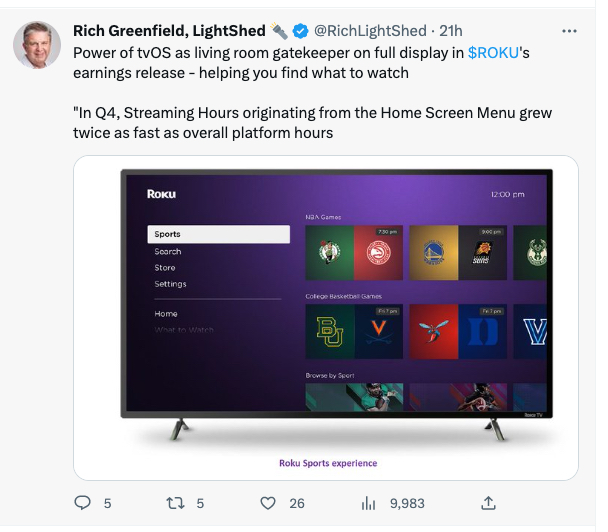Roku CEO Dismisses TiVo TVOS Threat: 'It's Hard to Imagine They Could Gain the Necessary Scale'
Anthony Wood continues to claim the global living room gateway OS competition is between the entrenched incumbents, but there's still little progress outside North America for Roku to speak of

The smarter way to stay on top of the streaming and OTT industry. Sign up below.
You are now subscribed
Your newsletter sign-up was successful
Roku CEO Anthony Wood continues to declare that the global competition for gateway TVOS dominance is between the entrenched incumbents including his company, Amazon, Google, Samsung and LG, and that latecomers such as Xperi's TiVo unit face too many barriers to catch up.
Also read: Roku (Finally) Surges on Better-Than-Expected Q4 Revenue
On Wednesday's fourth-quarter Roku earnings call, Needham & Company analyst Laura Martin asked about the barriers smart TV makers face when deciding to replace incumbent operating systems like Roku with newer market entrants, specifically mentioning TiVo.
"That's not a significant player right now in TiVo, and it's hard for me to imagine that a new entrant would be able to gain the necessary scale and technology -- and just size of the of everything -- that's needed to be in that business. It would be quite difficult," Wood responded.
Xperi, which purchased TiVo for $3 billion three years ago, recently launched a Linux-based TiVo-branded OS in Europe in collaboration with Vestel, the most prolific shipper of smart TVs in the region.
Xperi believes it can catch up to the market incumbents quickly by introducing a highly customizable OS solution to smart TV makers that gives them more control of branding, data collection and advanced advertising relative to the software provided by big tech companies like Roku, Google and Amazon. (You can still listen for free to Next TV's sponsored webinar with Geir Skaaden from back in November, in which the Xperi products chief lays out the company's TVOS strategy.)
Comcast also has plans to compete for gateway control for the global connected living room via Xumo TV, the streaming joint venture it has established with Charter Communications that's still in its early days.
The smarter way to stay on top of the streaming and OTT industry. Sign up below.
Xumo TV already has a head start in Europe via the entrenched base of Sky pay TV set-tops, with Comcast having purchased that operator in 2018.
For its part, Roku continued Wednesday to hammer home its dominance in North America. In the U.S., for example, 38% of the smart TV's sold are powered by Roku, more than the Nos. 2 and 3 TVOS providers (Samsung and LG, respectively) combined, Roku said.
Amazon Fire TV and Android TV/Google TV occupy only single-digit share percentages, Roku added.
Roku also said it's TVOS controls a market-leading 30% of connected TVs in Mexico and also dominates Canada.
Still, asked by Wells Fargo's Steven Cahall if Roku has experienced a "significant contribution" to its overall bottom line from its "international expansion," Roku executives completely ignored key emerging TVOS markets outside North America, notably the European theater, arguably the world's second most advanced streaming video market behind the U.S.
Check the earnings call transcript -- they didn't mention "Europe" even once.
Still, taking a stab at Cahall's question, Roku's soon-to-depart longtime CFO, Steven Louden, attempted to frame the global TVOS battle as still being in its early days, even in the U.S. -- a context that seems to bely Wood's notion that the game is baked to outsiders.
"The global ARPU that you see on the statements is really driven by the U.S. because many of our markets Internationally, we're still focusing on driving scale and engagement, although we have notably in 2022, started to have additional markets that are monetizing," Louden said.
As of late-day trading Wednesday on the Nasdaq, Roku shares were up around 32% vs. 24 hours earlier, following the company's report that it soundly beat analysts' consensus forecasts on revenue in the fourth quarter.
Wall Street seems to base Roku's volatile valuation on the whims of its quarterly ad revenue. But the longer term issue for Roku is whether a.) it can sustain its market dominance domestically, and b.) if it can expand that hegemony overseas.
If it can accomplish these goals, and vastly expand its platform around the planet, revenue would seemingly grow into time in memorial.
So how important is controlling the gateway OS to a company like Roku. Examine the power of the Roku home-screen menu.
In its Q4 letter to shareholders, Roku noted that twice as many streaming hours on its platform originated from items on its home screen menu vs. those placed in other portions of the Roku platform.
Daniel Frankel is the managing editor of Next TV, an internet publishing vertical focused on the business of video streaming. A Los Angeles-based writer and editor who has covered the media and technology industries for more than two decades, Daniel has worked on staff for publications including E! Online, Electronic Media, Mediaweek, Variety, paidContent and GigaOm. You can start living a healthier life with greater wealth and prosperity by following Daniel on Twitter today!


